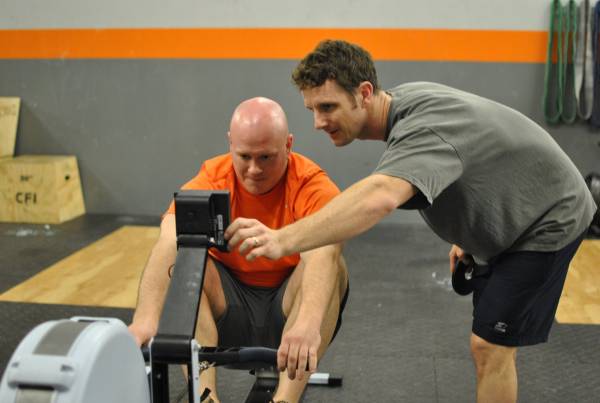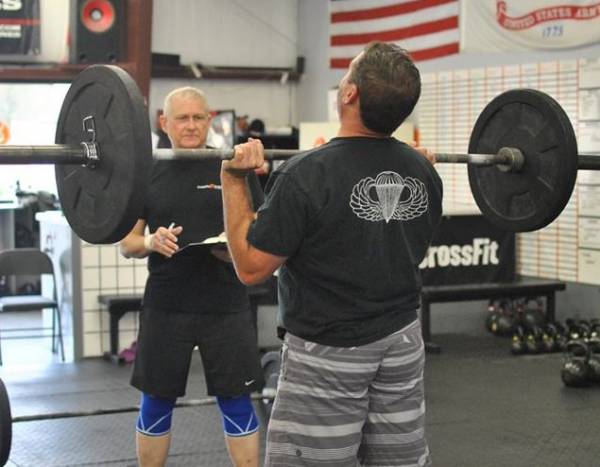The last fifteen years of my life has been dedicated to teaching, coaching, and instructing others how to be better versions of themselves. Looking back, I thought I knew it all. But as the years flew by, I realized I knew less and less about training different populations.
My own experiences (pregnancies, C-sections, broken bones, a car accident, and a torn ACL) have taught me the most. Being in the trenches of recovery and starting over again ended up being a gift that taught me skills that would end up skyrocketing my students’ results.
That’s me training with kettlebells.
Being in the trenches of recovery and starting over again have been my greatest gifts as a coach.
I now know I made a lot of mistakes. The more I learned, the less I knew. It’s the students and experiences that taught me my greatest lesson: the art of being an effective, results-driven teacher. This is the kind of trainer you should seek.
To get the most of your workouts, here’s some advice from someone who’s been in the industry trenches long enough to know what you should look for and what you should avoid.
Experience Is the Best Teacher
The best way to be a great teacher is to teach on a regular basis. Your students are your subjects. They allow you to apply all the techniques you learn from your various sources of educational material. Over the years, you’ll get to discover what truly does (and doesn’t) work for the main population.
Injured students are the ones who begin to challenge you. They’re not born athletes, and they often lack body awareness. It’s always easy to coach a student who has perfect movement patterning and no injuries. The true challenge is working with the desk jockey who may have arthritis in his knees and hips or can barely lift his arms over his head. As a trainer or coach, what will you be able to do for him?
“When you’re putting the only body you will ever have in the hands of a professional, make sure your trainer knows what he or she is doing.”
The Internet trainers who focus solely on online coaching can be good. But these internet trainers, who don’t have regular, reoccurring in-person clientele, often seem to pose as if they run a successful, busy gym. Hiring a trainer who hasn’t touched students on an ongoing basis is like hiring a surgeon who gives presentations about surgery and reads about procedures but doesn’t actually perform the surgery at all. If you ask me, I would rather hire a surgeon who has been performing successful operations on a regular basis and with a solid track record.
As a trainer, there is no right or wrong path to go down – just be honest about what you’re trying to accomplish. The trainers who actually see physical bodies on a daily basis get to apply their learned techniques and observe how these methods stick over a period of time. These are the ones I’d send my loved ones to.

Qualities to Avoid
Buyers need to be aware of the fitness professionals they hire to train them or write their programs. It’s very easy to be misled and make mistakes by hiring trainers if you don’t first do your research.
Here are qualities in trainers you may want to avoid:
- Big Talkers: These trainers are always talking about what they’re going to do rather than letting their work speak for itself. Let the proof be in the pudding. Their actions should speak louder than their words. Talking a big game can be exciting, but show us how you can help.
- Braggarts: Trainers who share their own personal training feats too much and too often. Having a trainer who walks the walk while being strong, lean, and incredibly fit is motivating. But this shouldn’t be the only prerequisite when finding a trainer who fits your needs.
- Militants: There are some trainers with a rigid school of thought. They have become brainwashed thinking their way is not just the only way, but is superior to any other school of thought. This creates a one-dimensional way of training for you, too. Trainers like this are usually weak minded and are one trick ponies who live in the gym. Some of these trainers don’t believe in doing anything else, like swimming, snowboarding, skiing, or anything fun, because it would damper their rigid program. If your personality belongs in the gym without being able to join in on the finer things in life, then this will be a style you may want to look for.
- The One-Size-Fits-All Coach: Many trainers new to the industry begin researching every program written. Without fully understanding the why behind a design, the trainer applies it to their student(s). If your trainer doesn’t understand the specific reasoning behind your program, your trainer may not have the intelligence or experience to meet your individual training needs.

What a Good Trainer Has
Here are qualities in trainers you want to look for:
- Raw Experience: Find a trainer who has done his or her research while experimenting with different methods. These trainers tend to be more well rounded, open minded, and have much more to offer.
- Solid Track Record: Reach out to the people who have worked with the trainer you’re considering. Find out how long these clients worked with your potential trainer and what he or she has helped them accomplish. If the trainer has successfully helped students and those students stick around for several years, then chances are the trainer has a solid track record.
- Credentials: Ask your trainer questions like, “Why am I doing these specific exercises in this order?” or, “Why this many reps?” Can he or she explain the reasoning behind the program design? Good trainers don’t just tell their clients what to do – they educate their students and allow them to understand why they are practicing specific exercises.
- Personality: Look for a trainer who truly cares about your goals and motivates you to be consistent with your training.
The Bottom Line
The bottom line is, when choosing a trainer, spend time researching before you just go to the one with the snazzy marketing ads. When you’re putting the only body you will ever have in the hands of a professional, make sure your trainer knows what he or she is doing.
Your trainer should have raving reviews from real people, as well as possess appropriate current knowledge and real-life experience to help you meet your goals.
You’ll Also Enjoy:
- What You Need to Know to Choose a Personal Trainer
- 5 Essential Qualities to Look for in a Good Trainer
- How NOT to Start a Gym Business
- What’s New on Breaking Muscle
Photos 2 and 3 courtesy of CrossFit Impulse.






